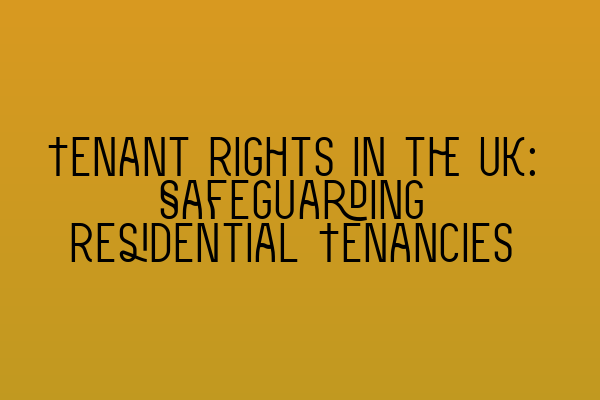Tenant Rights in the UK: Safeguarding Residential Tenancies
As a solicitor specializing in property law, it is important for me to provide valuable information to tenants, ensuring they understand and protect their rights as residents in the United Kingdom. Residential tenancies can often be a complex field, so I have compiled this comprehensive guide to help you navigate through the intricacies of tenant rights in the UK.
It is crucial for tenants to be aware of their legal rights and responsibilities, as well as the obligations of their landlords. Having a solid understanding of these rights will not only ensure a smooth and hassle-free tenancy, but it will also safeguard your position as a tenant.
1. Right to a Written Tenancy Agreement:
First and foremost, it is essential to have a written tenancy agreement in place. This agreement outlines the terms and conditions of your tenancy, including rent, deposit, notice periods, and other vital details. If your landlord fails to provide a written agreement, make sure to request one. Alternatively, you may consider seeking legal advice to clarify your rights in such a situation.
2. Deposit Protection:
Did you know your landlord is legally required to protect your deposit in a government-approved tenancy deposit scheme? This protection ensures that your deposit is not at risk and will be returned to you at the end of the tenancy, provided you have fulfilled your obligations as a tenant. If your landlord fails to protect your deposit, you may be entitled to compensation. Familiarize yourself with the specific regulations surrounding deposit protection to safeguard your rights.
3. Maintenance and Repairs:
As a tenant, you have the right to reside in a safe and habitable property. Your landlord is responsible for ensuring necessary maintenance and repairs are carried out promptly. This includes fixing structural issues, plumbing problems, electrical faults, and other essential repairs. If your landlord neglects their responsibilities in this regard, you may be entitled to compensation or even seek legal action.
4. Quiet Enjoyment of the Property:
Tenants have the right to enjoy their rented property without unnecessary interference from the landlord. This means that landlords cannot enter the property without prior notice or consent, except in certain emergencies. It is important to familiarize yourself with the guidelines regarding landlord access and protect your right to quiet enjoyment of the property you are renting.
5. Notice Periods and Evictions:
Understanding the proper eviction procedures is crucial for tenants. Landlords must adhere to specific notice periods depending on the type of tenancy agreement in place. Being aware of these notice periods ensures that you have sufficient time to find alternative accommodation if necessary. It is also important to familiarize yourself with the grounds for eviction and the reasons for which landlords may legally terminate a tenancy agreement.
6. Discrimination and Harassment:
Tenants in the UK are protected under anti-discrimination laws. Landlords cannot discriminate against tenants based on gender, race, religion, disability, sexual orientation, or other protected characteristics. If you believe you have been subjected to discrimination or harassment by your landlord, it is important to seek legal advice to protect your rights and seek solutions.
7. Dispute Resolution:
Should any disputes arise between you and your landlord, it is advisable to seek resolution through negotiation or mediation. If these methods fail to resolve the issue, you may need to pursue legal action. It is always beneficial to have a clear understanding of your rights and responsibilities, as well as maintaining a record of correspondence and evidence to support your case.
In conclusion, tenant rights play a fundamental role in safeguarding residential tenancies in the UK. By familiarizing yourself with these rights, you can ensure a smooth and hassle-free tenancy and protect your position as a tenant. If you ever have any concerns or doubts regarding your rights or any aspect of your tenancy, it is advisable to consult with a legal professional who specializes in property law.
To assist you further in your legal journey, SQE Property Law & Land Law offers comprehensive preparation courses for the SQE 1 and SQE 2 exams. Whether you require practice exam questions or mock exams for the SQE 1, or preparation courses for both SQE 1 and SQE 2, we have got you covered. Check out our related articles and resources to enhance your understanding of property law and prepare for the SRA SQE exams:
– SQE 1 Practice Exam Questions
– SQE 1 Practice Mocks FLK1 FLK2
– SQE 2 Preparation Courses
– SQE 1 Preparation Courses
– SRA SQE Exam Dates
At SQE Property Law & Land Law, we are committed to providing you with the necessary knowledge and skills to excel in your legal career. Remember, your rights matter, and by understanding and protecting them, you can ensure a fair and secure tenancy.
